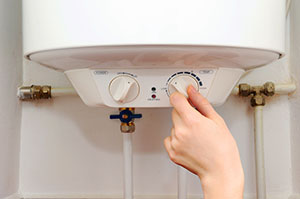Boilers across homes in Scotland are the most resilient when it comes to breaking down, despite being home to the UK’s coldest temperatures according to the results of a new study.
The 2020 UK Boiler Breakdown Study, examined the amount of properties across the UK mainland and boiler breakdowns to establish the UK’s worst locations for boiler reliability. It found that just 1.79% of properties in Scotland reported problems with their boiler in 2019 - the lowest across the UK.
This comes despite the fact that average temperatures across Scotland are markedly lower when compared to the rest of the UK mainland.
In 2019, the average temperature north of the border was just 7.9℃, compared to England (10.4℃) and Wales (9.7℃), suggesting that Scottish boilers are more resilient to the colder conditions, or that residents are more reluctant to turn them on when it gets cold.
The figures*, which have been compiled by Boiler Guide, found that properties in London experienced the largest amount of boiler-related problems over the course of last year with almost 3 in 100 experiencing problems. The West Midlands (2.75%) and the North East (2.42%) followed closest behind.
Northern regions of the UK faired well when compared to the rest of the UK when it came to reliability; behind Scotland was the North West (1.92%) and Yorkshire and the Humber (1.97%) which incidentally are also the softest water areas of the country.
Full results are as follows:
London (2.91%)
West Midlands (2.75%)
North East (2.42%)
East Midlands (2.21%)
East (2.17%)
South East (2.11%)
Wales (2.05%)
South West (1.97%)
Yorkshire and the Humber (1.97%)
North West (1.92%)
Scotland (1.79%)
David Holmes, the founder of Boiler Guide which commissioned the research, said:
“You would assume that due to its colder average temperatures that boilers would be in significant demand across homes in Scotland so it is a bit of a surprise to see them top the rankings when it comes to reliability. Maybe those up North simply look after their boilers better or simply don’t have them turned on as much as further down south!
“However, when looking at areas towards the other end of the scale, London is synonymous with having an abundance of ‘older’ residential and commercial properties, with many containing older heating systems that are in dire need of repair. Coupled with the higher occupancy rates and the dense population of the region, the strain put on boilers and other home heating systems is hard to ignore.”
The report also found there was a clear link between hard water areas and the frequency of boilers breaking down, as well as links to the percentage of home ownership with areas dominated by rental properties such as in London, the North East and the West Midlands where homes are more likely to experience a breakdown. This is likely due to tenants not keeping a close eye on the condition of their boiler, or not living in a property for a long enough time to notice any changes.
Tony Jones, General Manager at Harvey Water Softeners, said:
“While many people often refer to how the hardness of water can affect its taste, it’s actually the other implications of hard water on the home and to lives in general that are greater causes for concern.
“It’s troubling to think that just the water coming from our taps can cause so much damage to our home, but unfortunately the UK is fraught with aggressively hard water which causes a wealth of problems for our boilers.”
How to Prevent a Boiler Breakdown
Get your boiler serviced every year by a Gas Safe engineer. A boiler is much like a car in that it needs to be maintained to keep it in good working condition. The annual boiler service is an engineer’s opportunity to check the boiler is working efficiently, effectively and safely. They will also be able to catch small issues before they cause a major problem and will clean and replace parts which are showing signs of wear and tear.
Insulate your pipes. To prevent frozen pipes you can wrap them in pipe insulation which you get from most DIY stores for very little money. If you’re concerned that your pipes are frozen, you can often thaw them by pouring warm water on them or with a hot water bottle.
Carry out some occasional boiler maintenance. For example, check that the water pressure level is between 1 to 2 bars (and adjust it if it’s not) and that the pilot light is a strong blue flame (not yellow or orange). Your radiators will also need bleeding now and again to get rid of air pockets which build up over time and will stop your radiators from heating up fully.
Turn your central heating on during the summer. Obviously, your heating shouldn’t be on continuously during the summer, but leaving a heating system inactive for too long can cause the system to stagnate and blockages to form. To keep the water flowing through the pipes, turn your heating on for 15 minutes once a month during the summer.
You should get to know how your boiler works and to recognise when there might be a problem. Listen for odd noises and if the boiler seems to be struggling to reach a high enough temperature, don’t ignore it as it’s unlikely things will get better without some maintenance or a repair.
For more information and the full results of this research, visit https://www.boilerguide.co.uk/articles/boilers-blink-uk-boiler-breakdown-study-2020
*These figures are based on the total amount of boiler repair of enquiries received by Boiler Guide In 2019 and divided by the total number of properties in each region (based on ONS statistics).

Add new comment